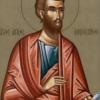Onesimus - You can run but not hide
Onesimus - You can run, but you can't hide
"Where isn't God present? . . . If you are going to run from Him, run to Him." – Augustine

"Where isn't God present? . . . If you are going to run from Him, run to Him." – Augustine
Onesimus is one of the more obscure figures in the Bible. We meet him only twice in Scripture: His story is introduced in Paul’s epistle to Philemon, and he is mentioned briefly in Paul’s later-written letter to the Colossians. But in the ancient church he was widely known and regarded for his tireless service as a co-laborer with Paul and for his unwavering faith. And his story has resonated down through the ages as an inspirational example of godly submission, commitment to God’s calling on his life, and willingness to follow the voice of God’s call wherever it led him.
When we first encounter Onesimus, he is traveling back to his home in Colossae from Rome. There he had met Paul, held in the same jail – Paul “a prisoner of Jesus Christ,” and Onesimus a runaway slave. We don’t know why he ran. As a house slave, his life was certainly less harsh than slaves forced into manual labor. He may have been a domestic servant, or done more highly skilled work such as accounting or tutoring. He may have been born into slavery, or taken captive during Roman imperial expansion, or perhaps sold into servitude to pay a family debt. Whatever his exact position and background, Onesimus fled the house of his master, Philemon, likely haven stolen money or property. In God’s grace, he found himself in the company of the apostle Paul, through whose testimony and teaching he became a believer and follower of Christ. Paul’s affection for Onesimus as “his child” in the faith and a beloved brother in Christ was such that he would have been glad to keep him there, to minister to and with him in prison. But by law he must be returned to his master. And so he went, accompanied by a letter from Paul urging forgiveness and reconciliation.
What were Onesimus’ thoughts on the road? Roman law gave masters nearly unlimited authority for punishment of runaway slaves, even including execution. But Onesimus also knew that his master was a believer. One of the churches in Colossae met in the house of Philemon and Apphia (thought to be his wife) and Archippus (most likely their son). Paul addressed Philemon as a “beloved brother and fellow-worker.” Rather than ordering him to be lenient, Paul appealed to him in love; and on the basis of their friendship, Paul offered to repay any debt Onesimus owed. Paul added a bit of lightness to the letter, promising Philemon that Onesimus, who previously was “useless” to him, would now be “useful” to both him and Paul. (The name Onesimus means useful, beneficial, or helpful.) And he asks Philemon to receive back Onesimus “no longer as a slave, but as more than a slave, as a beloved brother.” Paul didn’t overtly ask Philemon to grant Onesimus’ freedom, but he closed his letter by stating his confidence that Philemon would do even more than he had requested. What would be the outcome?
Philemon and his house were reconciled with Onesimus, and sent him back to Paul to learn, to work with him, and to travel with others from church to church (see Col. 4:7-9ff.). Tradition tells us that Philemon became a bishop in Colossae. Onesimus continued his missionary efforts for the gospel, became known as an apostle, and was named the bishop of Ephesus after Timothy’s tenure. Death came to Onesimus during the wave of persecution under the Roman emperor Domitian; he was martyred by stoning in c. 95 A.D.
Questions for Reflection:
What parts of Onesimus’ story do you find most interesting? Compelling? Inspiring?
Do you identify with any parts of Onesimus’ story?
Do you know anyone else, or know of anyone else, whose story contains similar elements?
What do you hear God saying to you as you meditate on his life, and God’s working in and through him?
Meditation: Psalm 139:1-18
Psalm 139:1-18 (NIV)
For the director of music. Of David. A psalm.
1 You have searched me, Lord,
and you know me.
2 You know when I sit and when I rise;
you perceive my thoughts from afar.
3 You discern my going out and my lying down;
you are familiar with all my ways.
4 Before a word is on my tongue
you, Lord, know it completely.
5 You hem me in behind and before,
and you lay your hand upon me.
6 Such knowledge is too wonderful for me,
too lofty for me to attain.
7 Where can I go from your Spirit?
Where can I flee from your presence?
8 If I go up to the heavens, you are there;
if I make my bed in the depths, you are there.
9 If I rise on the wings of the dawn,
if I settle on the far side of the sea,
10 even there your hand will guide me,
your right hand will hold me fast.
11 If I say, “Surely the darkness will hide me
and the light become night around me,”
12 even the darkness will not be dark to you;
the night will shine like the day,
for darkness is as light to you.
13 For you created my inmost being;
you knit me together in my mother’s womb.
14 I praise you because I am fearfully and wonderfully made;
your works are wonderful,
I know that full well.
15 My frame was not hidden from you
when I was made in the secret place,
when I was woven together in the depths of the earth.
16 Your eyes saw my unformed body;
all the days ordained for me were written in your book
before one of them came to be.
17 How precious to me are your thoughts, God!
How vast is the sum of them!
18 Were I to count them,
they would outnumber the grains of sand—
when I awake, I am still with you.
Prayer:
I am no longer my own, but Yours.
Use me as You choose;
rank me alongside whoever You choose;
put me to doing, put me to suffering;
let me be employed for You, or laid aside for You,
raised up for You, or brought down low for You;
let me be full, let me be empty;
let me have all things, let me have nothing;
with my whole heart I freely choose to yield
all things to Your ordering and approval.
So now, God of glory,
Father, Son, and Holy Spirit,
You are mine, and I am Your own.
– from the traditional Covenant Renewal prayer
(adapted by John Wesley, published in 1780).
A thought about worship from the Ancient Fathers –
“If ‘we assure our hearts,’ we must do so ‘before Him.’ Because ‘if our heart thinks ill of us’ or accuses us that we aren’t doing something with the right attitude, ‘greater is God than our heart, and knoweth all things.’ You may hide your heart from people, but try to hide it from God! How can you hide it from Him? For a fearing, confessing sinner said to God, ‘Whither shall I go from Thy Spirit? and from Thy face whither shall I flee?’ He looked for a way to run away from God’s judgment, but he couldn’t find any escape. For where isn’t God present? ‘If I shall ascend,’ he said, ‘into heaven, Thou are there: if I shall descend into hell, Thou art there.’ So where will you go? Will you listen to this advice? If you are going to run from Him, run to Him. Run to Him by confessing, not from Him by hiding. . . . So say to Him, ‘Thou art my place to flee unto,’ and be nourished by His love that leads to life. Let your conscience prove to you that your love is from God. And if it is from God, don’t desire to display it to people. For human praises can’t lift you to heaven, nor can their condemnations bring you down from there. Let Him who crowns you see. Let Him who judges and rewards you be your witness.”
– Augustine, Bishop of Hippo (354 - 430 A.D.)
Revised Common Lectionary, Proper 18 (Year C):
Jeremiah 18:1-11
Psalm 139:1-6, 13-18
Deuteronomy 30:15-20
Psalm 1
Philemon 1:1-21
Luke 14:25-33
This Reflection is adapted from one of Ellen’s entries a in small group study series for autumn 2018, The Saints in Our Lives.
Image information: Icon of Onesimus. Public domain.
Copyright ©2018 Ellen Koehler. All Rights Reserved.


Login or Register
to view and post comments